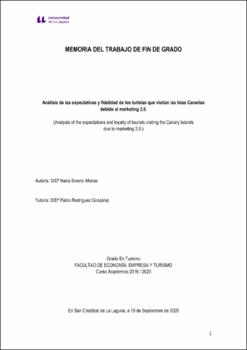Análisis de las expectativas y fidelidad de los turistas que visitan las Islas Canarias Debido al Marketing 2.0
Fecha
2020Resumen
Las ventas de destinos han ido variando con el tiempo y en esta variación ha surgido el
marketing 2.0, en él las redes sociales y las páginas web han marcado un antes y un después
dándole mayor importancia a la reputación de un bien o servicio. De este concepto ha nacido la
reputación online, jugando un papel fundamental en las empresas, ya que esta reputación que
se encuentra en páginas web y redes sociales es algo permanente en el tiempo. Con estos
puntos se tiene en cuenta no solo al turista como un número, sino también qué es lo que éste
siente y como podemos aumentar los buenos sentimientos, para que sus experiencias lleguen a
cumplir sus expectativas y terminen superando su satisfacción de la mano del marketing
experiencial.
Este trabajo busca analizar la cantidad de turistas que reservan mediante el marketing 2.0, la
satisfacción que han obtenido y la fidelidad con el destino a través de los datos que nos
proporciona el Instituto Canario de Estadística - ISTAC filtrados por Turismo de Tenerife. Sales of destinations have varied over time and in this variation 2.0 marketing has emerged, in
which social media and web pages have marked a before and after giving greater importance to
the reputation of a place. From this concept, online reputation was born, playing a fundamental
role in companies since this reputation found on web pages and social networks is something
permanent over time. With these points, not only the tourist is taken into account as a number but
also what he or she feels and how we can increase the good feelings so that their experiences
meet their expectations and end up exceeding their satisfaction with the help of experiential
marketing.
This work seeks to analyze the number of tourists who book through 2.0 marketing, the
satisfaction they have obtained and the loyalty with the destination through the data provided by
ISTAC filtered by Turismo de Tenerife.





